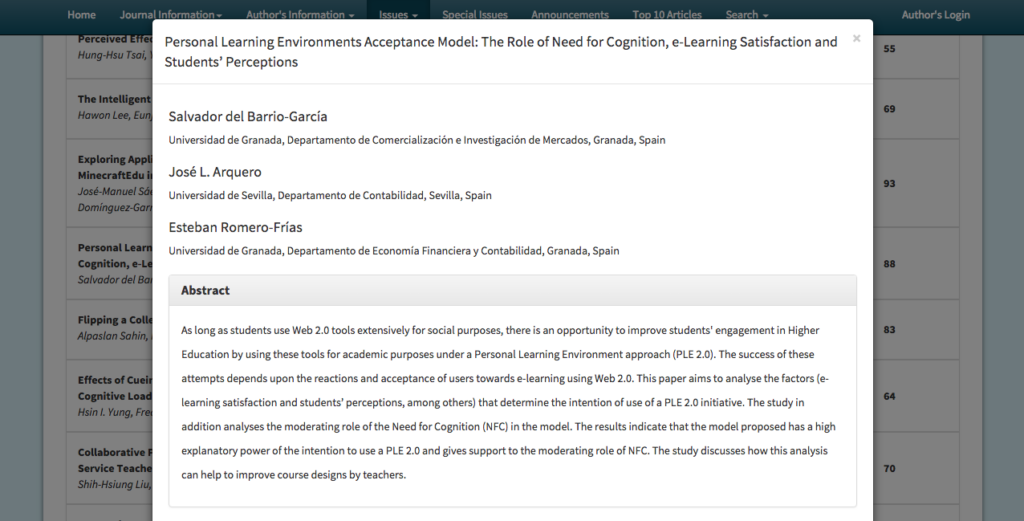Este mes de julio se ha publicado el artículo “Personal Learning Environments Acceptance Model: The Role of Need for Cognition, e-Learning Satisfaction and Students’ Perceptions” en la revista Journal of Educational Technology and Society (2015, Vol. 18, Issue 3; pp. 129-141), del que soy autor junto con Salvador del Barrio y José Luis Arquero (enlace al número de la revista). El índice de impacto de la revista tomando en cuenta los últimos 5 años es según el informe JCR 2014 de 1,376.
La forma de citar el artículo es:
ARQUERO, J.L., DEL BARRIO, S., & ROMERO-FRÍAS, E. (2015). “Personal Learning Environments Acceptance Model: the role of Need for cognition, e-learning satisfaction and students’ perceptions”. Journal of Educational Technology & Society, 18 (3): 129-141.
La investigación explora los factores que determinan la aceptación de diversas herramientas de la Web 2.0 dentro un marco que pretende estimular el desarrollo y enriquecimiento del Entorno Personal de Aprendizaje de los estudiantes. En concreto se investiga el papel de la “satisfacción por el e-Learning” y diversas percepciones de los estudiantes sobre cuestiones como el aprendizaje colaborativo, el aprendizaje activo, el aprendizaje de contenidos o las capacidades comunicativas. En todo el modelo planteado la variable “necesidad de conocimiento” actúa como una variable moderadora. Nuestro objetivo es ayudar a explicar de qué forma se determina la aceptación de estos modelos de aprendizaje por parte de los estudiantes con el objeto de que en función de sus perfiles se puedan adoptar estrategias distintas.
Dejo el resumen en inglés:
As long as students use Web 2.0 tools extensively for social purposes, there is an opportunity to improve students’ engagement in Higher Education by using these tools for academic purposes under a Personal Learning Environment approach (PLE 2.0). The success of these attempts depends upon the reactions and acceptance of users towards e-learning using Web 2.0. This paper aims to analyse the factors (e-learning satisfaction and students’ perceptions, among others) that determine the intention of use of a PLE 2.0 initiative. The study in addition analyses the moderating role of the Need for Cognition (NFC) in the model. The results indicate that the model proposed has a high explanatory power of the intention to use a PLE 2.0 and gives support to the moderating role of NFC. The study discusses how this analysis can help to improve course designs by teachers.
Keywords: Learning experience, Personal learning environment, Learning satisfaction, Need for cognition, Open education.
Si alguien necesita una copia del artículo me puede solicitar una copia privada a través de erf@ugr.es.

